The Trump Administration Waives Obscure Safety Rule Blocking Driverless Trucks
Federal safety regulators have granted driverless truck company Aurora's requested waiver of the warning triangle rule that had acted as a de facto requirement for human drivers in autonomous trucks.

Amid the ongoing shutdown drama, federal transportation officials quietly relaxed an obscure safety regulation that has been stymying the rollout of driverless trucks.
On October 9, the Federal Motor Carrier Safety Administration (FMCSA) granted driverless trucking company Aurora's request for a waiver to the federal government's safety triangle rule, which requires that roadside safety placards be placed around disabled trucks.
This seemingly simple rule has acted as a de facto ban on autonomous trucking operations, as a human is needed to place those warning triangles on the road.
The FMCSA's waiver gives Aurora permission to instead use cab-mounted warning beacons to alert passing drivers to disabled trucks on the road.
While a limited and temporary measure, the autonomous vehicle industry is celebrating the waiver as a major step forward for the nascent industry.
"This obscure federal regulation is something I think most people in this industry had never heard of until they found out it potentially poses a problem for their new driverless trucks," says Marc Scribner, a transportation policy researcher at the Reason Foundation (which publishes this website). "This is following the appropriate course of action. These waivers in order to allow new technologies and practices that may not meet legacy requirements."
The fight over the warning triangle rule stretches back two years and has pitted the autonomous vehicle industry against unionized transportation workers who oppose the rollout of driverless vehicles.
Aurora, alongside Waymo's driverless trucking division, first requested a waiver from the rule from the Biden administration in 2023, citing their own studies showing that drivers were just as apt to slow down for cab-mounted warning beacons.
That provoked fierce opposition from unions, who cast doubt on the companies' studies and objected to the very idea of driverless trucks on America's roads.
On the state level, the Teamster union has proposed a number of failed bills that would require "human safety operators" in larger commercial vehicles.
This was enough to convince the Biden administration's FMCSA, which rejected Aurora and Waymo's waiver requests on the grounds that the companies had failed to prove that cab-mounted beacons would be as safe as road-placed warning triangles.
"The reason for denying Aurora and Waymo's petition was that they didn't have any evidence that it would be an equivalent level of safety or better. But then they say the existing standard doesn't have any evidence to support it," said Scribner to Reason back in September.
This irony was not lost on Aurora and Waymo, which sued the Biden administration in January on the grounds that the data they provided in favor of cab-mounted beacons was far more comprehensive than anything the administration could offer to support the superiority of warning triangles.
To the disappointment of some within the autonomous vehicle industry, the Trump administration continued to fight those lawsuits and refused to grant the requested waivers. This raised some fears that the Trump administration, too, would end up siding with unionized truck drivers over the autonomous vehicle industry.
In early October, the Trump administration's nominee to head FMCSA, Derek Barrs, was finally confirmed by the Senate.
The following week, Barrs' FMCSA granted Aurora its requested waiver. The company has since moved to dismiss its lawsuit against the administration.
Aurora's waiver is temporary and will need to be reapproved every three months. It also requires the company to collect data on the efficacy of cab-mounted warning beacons.
The terms of the waiver also provide for other companies to receive their own waivers, provided they abide by the same terms.
This additional data could provide the evidence that Congress needs to more permanently amend the safety triangle rule when it considers a surface transportation reauthorization bill next year.
Rent Free is a weekly newsletter from Christian Britschgi on urbanism and the fight for less regulation, more housing, more property rights, and more freedom in America's cities.


Show Comments (34)